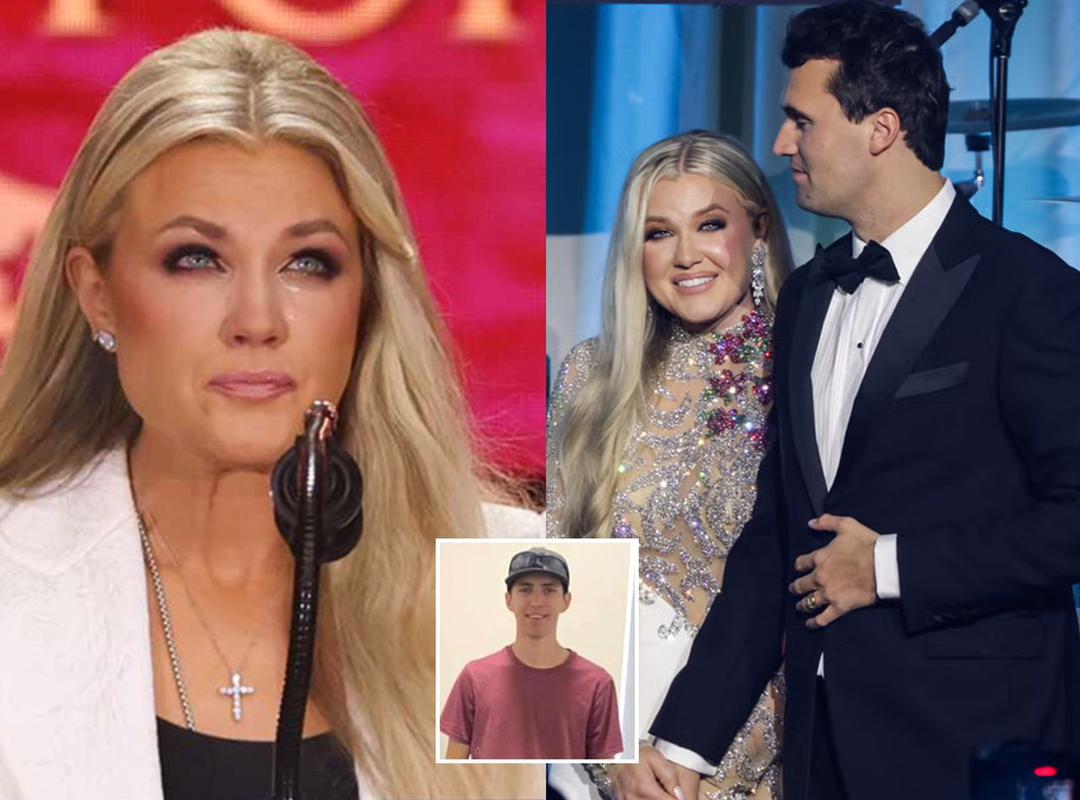
“I Forgive Him Because That’s What Jesus Did” – Erika Kirk Stuns the World with Emotional Forgiveness for Her Husband Charlie Kirk’s Killer

In a world where tragedy often sparks anger, bitterness, and cries for vengeance, Erika Kirk has chosen a path that has stunned many and inspired countless others. The widow of late American conservative activist and commentator Charlie Kirk has announced that she has forgiven the man accused of brutally ending her husband’s life. In her own words, Erika explained her decision by saying, “I forgive him because that’s what Jesus did and what my husband would do.” Her statement has since gone viral, sending shockwaves across social media platforms, mainstream media outlets, and religious communities, as people continue to grapple with the depth of such radical forgiveness in the face of profound personal loss.
Charlie Kirk, founder of Turning Point USA and a polarizing yet influential figure in American politics, was reportedly murdered under circumstances that still remain under investigation. News of his tragic death sent tremors through political circles, leaving supporters devastated and critics stunned. In the midst of the grief and mourning, Erika’s words of forgiveness cut through the noise with a message that was at once jarring and inspiring. Many expected anger or condemnation, but instead she chose to model the principles of her faith, echoing a message of mercy and grace even in her darkest hour.
The widow’s statement was made during a brief press appearance and later shared across her social media pages, where she poured her heart out about the pain of losing her husband while also choosing to honor his memory by embodying the values he held dear. “Charlie believed in accountability, but he also believed in redemption,” Erika said with visible emotion. “I am heartbroken, and nothing will ever take away the pain of losing him, but I cannot let hatred destroy me. Forgiveness doesn’t mean forgetting or excusing what happened, but it means freeing myself from the prison of bitterness. I forgive him because that’s what Jesus did and what my husband would do.”
Her words immediately drew mixed reactions from the public. Some hailed her as a woman of unshakable faith, a beacon of grace at a time when vengeance might feel more natural. Religious leaders across the United States praised her for embodying the Christian teaching of unconditional forgiveness, comparing her courage to that of historical examples of faith-driven mercy. Others, however, questioned whether such forgiveness might undermine the seriousness of the crime or send the wrong message about justice. Critics argued that while forgiveness is admirable, the accused must still face the full weight of the law, and that Erika’s public statement could potentially complicate public perception of the case.
Despite the controversy, the emotional power of her words cannot be denied. Social media erupted with reactions, with thousands of people sharing clips of her speech and leaving messages of support, prayer, and admiration. Hashtags like #ErikaKirk, #RadicalForgiveness, and #WhatJesusWouldDo trended for hours as users debated the meaning of her decision. Many confessed that they could not imagine themselves forgiving someone who murdered their spouse, while others saw her statement as an act of strength rather than weakness.
The depth of Erika’s forgiveness also sparked discussions about faith, justice, and humanity. Religious communities, particularly Christian groups, seized upon her words as a reminder of the core message of their faith—love and forgiveness even for enemies. Sermons across churches in the U.S. cited her statement as a modern-day example of living out the words of Christ, while others used it to emphasize the importance of separating forgiveness from legal justice. Erika herself clarified this distinction, saying, “Forgiveness does not erase the crime, and it does not mean there should not be justice. The man who killed Charlie will face trial, and I trust the justice system to do its job. But in my heart, I refuse to let hatred win. That is my choice.”
Observers note that Erika’s decision mirrors similar moments in history where victims’ families chose forgiveness over vengeance. From the families of victims of the 2015 Charleston church shooting, who famously forgave the perpetrator in court, to countless individual stories of mercy following violent crimes, her choice aligns with a tradition of radical grace that shocks the world precisely because it goes against human instinct.
The human side of her story is also deeply moving. Erika and Charlie Kirk had been married for years, often seen together at public events and celebrated as a couple who shared both political convictions and Christian faith. To lose him so suddenly and violently is a grief that many say would crush the average person. Yet Erika’s ability to rise above her pain and still extend forgiveness has left people questioning their own capacity for mercy. Her message resonated far beyond politics, touching ordinary people who may not have agreed with Charlie’s views but who recognize the universal nature of love, loss, and forgiveness.
As news networks continue to cover the unfolding investigation into Charlie Kirk’s death, Erika’s words have become a central part of the narrative, shifting the story from one of tragedy alone to one of resilience and hope. Political allies of Kirk have expressed solidarity with Erika, praising her for her grace even as they call for strict justice against the accused. Critics of Charlie, some of whom sparred with him publicly over his outspoken political stances, have also acknowledged the power of Erika’s forgiveness, noting that such compassion transcends ideology.
Erika’s choice also highlights the tension between personal forgiveness and public accountability. Legal experts have pointed out that while her forgiveness is morally significant, it does not and should not interfere with the judicial process. The accused will still face trial, and the evidence will determine the outcome. Yet her public act of mercy may influence how society views punishment, redemption, and the possibility of change even for those who commit grave offenses.
Beyond the courtroom and the headlines, Erika’s story is already touching individuals on a personal level. Stories of people reaching out to estranged family members, forgiving long-held grudges, or seeking reconciliation have begun to surface online, inspired by her example. It seems her words are doing more than just honoring her late husband—they are sparking a ripple effect of forgiveness and healing in communities far beyond her own.
As the world continues to mourn the loss of Charlie Kirk, one thing is clear: Erika’s decision to forgive has added an extraordinary layer of meaning to his legacy. Her words remind the world that even in the face of unbearable loss, love and mercy can still prevail. Whether people agree with her or not, her choice has challenged hearts and minds, forcing society to reexamine what it means to forgive and what it means to truly honor the values one holds dear.
“I forgive him because that’s what Jesus did and what my husband would do.” With these words, Erika Kirk has not only honored her husband’s memory but has also left an indelible mark on the world’s understanding of grief, faith, and forgiveness. In a time when anger and division often dominate public life, her voice stands out as a reminder that even the darkest tragedies can give rise to moments of extraordinary light.


